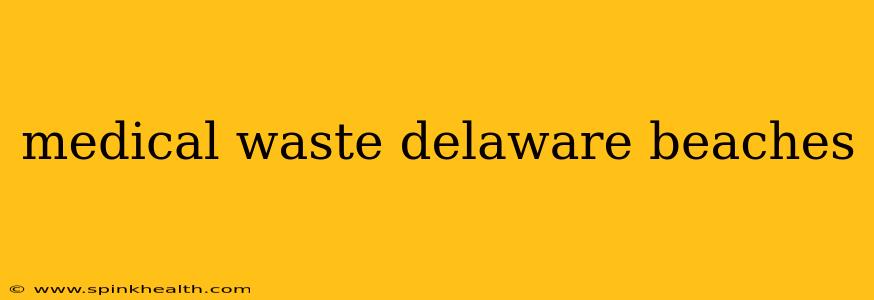The Unseen Threat: Medical Waste on Delaware's Beaches
Delaware's stunning coastline, with its pristine sands and refreshing ocean, attracts millions of visitors each year. But beneath the surface of this idyllic paradise lies a hidden concern: the potential for medical waste to wash ashore. This isn't a frequent occurrence, thankfully, but the possibility demands our attention. It's a story of responsible waste management, environmental protection, and the importance of community vigilance.
Imagine this: a sunny afternoon, the gentle waves lapping at your feet, the smell of salt air filling your lungs. Suddenly, you stumble upon something unexpected – a used syringe, a discarded bandage, or perhaps something even more alarming. The idyllic scene is shattered, replaced by a chilling realization: medical waste has found its way onto our beaches.
This isn't just an unpleasant surprise; it's a serious public health and environmental hazard. Infectious materials, sharp objects, and potentially harmful chemicals pose risks to both humans and wildlife. The impact ripples through the delicate ecosystem, affecting marine life, birds, and the overall health of our coastal environment.
How Does Medical Waste End Up on Delaware Beaches?
The journey of medical waste to our shores is often complex and multifaceted. It's rarely a deliberate act of dumping; instead, it's often the result of accidental release, improper disposal, or the unpredictable nature of ocean currents.
- Improper Disposal: While regulated, occasional lapses in proper medical waste disposal procedures – whether from healthcare facilities, research labs, or even individual homes – can lead to waste entering waterways, eventually reaching the ocean.
- Accidental Releases: Storms, flooding, and other natural events can disrupt waste disposal systems, causing unintentional release of medical waste into the environment.
- Ocean Currents: The powerful currents of the Atlantic Ocean can carry waste materials over vast distances, transporting debris from various sources across state lines and even internationally.
What Types of Medical Waste Might Be Found?
The types of medical waste encountered on Delaware's beaches can vary, ranging from relatively innocuous items to potentially hazardous ones. We might find:
- Sharps: Needles, syringes, lancets – these pose a significant risk of injury and infection.
- Infectious Waste: Contaminated bandages, dressings, and other materials that could carry infectious agents.
- Pharmaceutical Waste: Expired or discarded medications that can contaminate the environment and harm wildlife.
- Pathological Waste: Body parts or fluids – a rare but serious possibility.
What Should I Do If I Find Medical Waste on the Beach?
Do not touch it. Your safety is paramount. Instead, immediately:
- Report the finding: Contact the Delaware Department of Natural Resources and Environmental Control (DNREC) or your local authorities. Provide a detailed description of the location and type of waste encountered.
- Mark the area: If possible, safely mark the area to prevent others from accidentally coming into contact with the waste.
- Do not attempt to clean it up yourself: This is crucial. Improper handling can lead to injury and further contamination. Leave the cleanup to trained professionals.
What is Delaware Doing to Prevent Medical Waste on Beaches?
Delaware has implemented various regulations and initiatives aimed at preventing medical waste from reaching its beaches. These include strict guidelines for medical waste disposal, regular inspections of healthcare facilities, and public awareness campaigns. However, ongoing vigilance and cooperation are vital for success.
How Can I Help Prevent Medical Waste From Reaching Delaware Beaches?
Each of us has a role to play in protecting our beaches. Simple actions can make a significant difference:
- Properly dispose of all medical waste: Follow local guidelines for discarding sharps, medications, and other potentially hazardous materials.
- Support responsible waste management: Advocate for improved waste disposal systems and environmental protection policies.
- Participate in beach cleanups: Help keep our beaches clean and safe for everyone.
Delaware's beaches are a precious resource, and preserving their health and beauty is a collective responsibility. By understanding the risks associated with medical waste, taking preventative measures, and acting responsibly, we can help safeguard this vital part of our state's heritage for generations to come.

